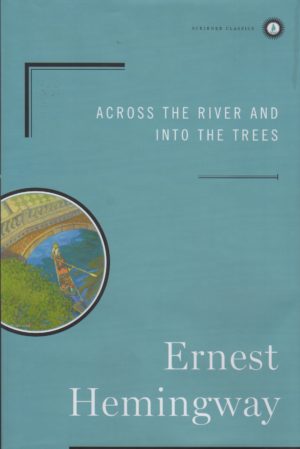
Across the River and into the Trees by Ernest Hemingway (1950. Scribner. ISBN 978-0-684-84464-0)
Mmmm. How to begin? How about with this. After being lured into the crazy world of writing, editing, and publishing by the seductive, dynamic, and brusque style of my authorial mentor; after diving headlong into the pool of words to create seven novels, a collection of short fiction, a biography, and one volume of essays, reading this book-the last novel written by Pappa Hemingway (The Old Man and the Sea came out two years later but is a novella)-made me feel like I’d hit my head on the bottom of that linguistic swimming pool. I should have heeded the critics who, when this book was released four years before I was born, panned it as “Hemingway’s worst” (see https://www.kirkusreviews.com/book-reviews/ernest-hemingway/across-the-river-into-the-trees/. But, being this was his last effort to write another Great American Novel, I had to give it a chance. Sadly, I must report those critics-most of whom are long dead (as is the author)-were spot on.
Here’s a story of a fifty-something combat officer, a career army man who’d served in both the Great War and WW II, and who’d spent considerable time during both conflicts in Italy. The Colonel falls in love with a 19 year old Italian girl, Renata (I’m not being pejorative here; the protagonist refers to her as “Daughter”) while on a duck hunting trip to Venice. Or perhaps, he met her somewhat earlier and they are ending their relationship. One can’t really be sure about timelines or much else in this jumble of a late-in-life Lolita story (Hemingway is more cautious with his lust for young things than Nabokov since Renata in this tale is at least older than the age of consent). What’s the problem, you ask?
First off, I’ve written before about sixty or seventy year old white men writing tales of love where the object of the thinly disguised autobiographical protagonist’s affection is a woman twenty or thirty or forty years younger than the male centerpiece. I’ve criticized Jim Harrison, Larry McMurtry, and John Irving for similar flights of fancy. Not because such December-May relationships don’t happen in real life (they do) but because the versions of this age old daydream from testosterone deprived men I’ve come across simply don’t ring true. Other than the classic Lolita I’ve yet to run across a novel that pulls off the December-May thematic alignment with poise and grace. Hemingway doesn’t do it here and additionally, in an apparent nod to Joyce and experimental prose, Hemingway discards punctuation, capitalization, sentences, plot, and any sort of meaningful tension to create interest in either the Colonel or his young mistress as the tale labors towards its predictable conclusion.
In addition, readers of this slender tome experience a fictional version of A Moveable Feast starring two lovers and no one else. There are no interesting supporting actors or actresses adding context or color to the tale. It’s boring, staid, and not at all titillating. Two scenes out of this 170 page disaster of a story convince me that, had he actually cared, Pappa could have pulled it off. The book’s beginning and end feature some fine writing about duck hunting in the tidal marshes of Italy. But if I want great duck hunting stories, I’ll read Sam Cook or Gordon MacQuarrie. Here, the outdoor scenes, while well written and concise, are too little, too late to save the plot or the characters or the author.
Pick up a copy of For Whom the Bell Tolls or The Sun Also Rises or Farewell to Arms and regale in Hemingway’s masterful, curt yet precise writing. Don’t waste your time on this outline of an old man’s lustful desires.
2 stars out of 5.
Peace.
Mark


